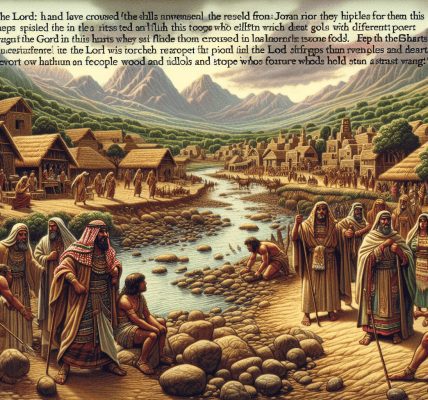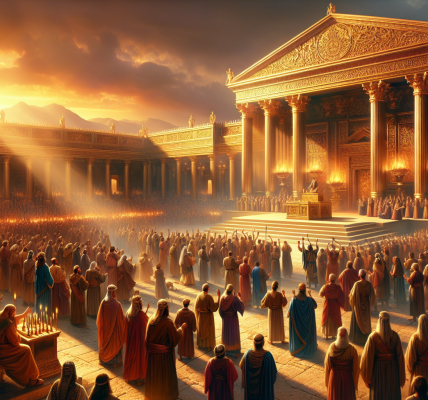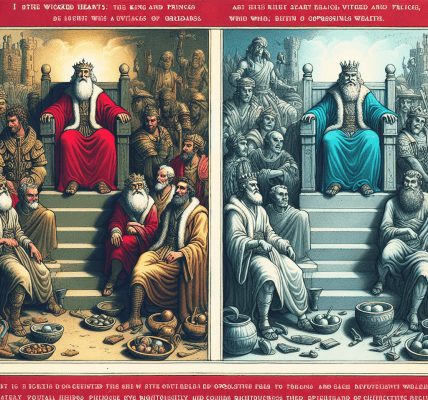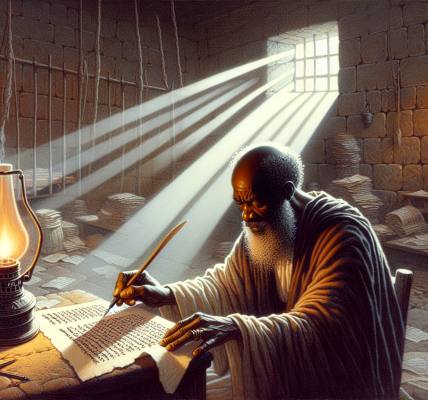**The Unfinished Conquest and the Lord’s Promise**
The sun hung low over the rugged hills of Canaan, casting long shadows across the land that the Lord had sworn to give to the tribes of Israel. Joshua, now advanced in years, stood upon a rocky outcrop, his weathered face turned toward the horizon. The battles had been many—Jericho’s walls had crumbled, kings had been defeated, and the land had trembled before the God of Israel. Yet, as the aging leader surveyed the territory, he knew the work was not complete.
The Lord’s voice came to him, steady and sure, as it had so many times before: *”You are old and advanced in years, and there remains yet very much land to possess.”*
Joshua bowed his head, feeling the weight of those words. Though the victories had been great, vast regions still lay unconquered—lands where the Canaanites, Philistines, and other nations clung stubbornly to their strongholds. The coastal plains, the dense forests of the north, and the towering cities of the Sidonians remained beyond Israel’s grasp.
The Lord continued, His words painting a picture of the land yet to be claimed:
*”This is the land that still remains: all the regions of the Philistines and the Geshurites, from the Shihor River east of Egypt to the territory of Ekron in the north (counted as Canaanite); the five lords of the Philistines—the Gazathites, Ashdodites, Ashkelonites, Gittites, and Ekronites; also the Avvim in the south; all the land of the Canaanites, and Mearah that belongs to the Sidonians, as far as Aphek, to the border of the Amorites; the land of the Gebalites, and all Lebanon, toward the sunrise, from Baal-gad below Mount Hermon to Lebo-hamath.”*
Joshua’s mind traced the boundaries in his memory—the rugged highlands, the fertile valleys, the great cedar forests of Lebanon. These were the lands promised to Abraham’s descendants, yet they remained untaken.
But the Lord was not finished. Though the conquest was incomplete, His promise stood firm.
*”I myself will drive them out from before the people of Israel. Only allot the land to Israel for an inheritance, as I have commanded you.”*
A surge of reassurance filled Joshua’s heart. The work was not his alone. The Lord would fight for His people, just as He had at Jericho and Gibeon. Israel’s task was to trust, to obey, and to divide the land in faith, knowing that the Lord would fulfill His word in His time.
With renewed purpose, Joshua summoned the leaders of Israel—the priests, the elders, and the heads of the tribes. Before them, he spread out the records of the land, the territories already conquered, and those yet to be claimed.
“Though our swords have not yet subdued every enemy,” Joshua declared, “the Lord has given us this land. He will drive out the remaining nations before us. Our duty now is to divide the inheritance among the tribes, as the Lord has commanded.”
And so, under Joshua’s direction, the land was apportioned—first to Reuben, Gad, and the half-tribe of Manasseh, who had already received their inheritance east of the Jordan. Their warriors had fought valiantly beside their brothers, and now their families would dwell securely in the lands of Gilead and Bashan, where their flocks roamed the lush pastures.
But even as the boundaries were marked, Joshua’s gaze lingered on the horizon. The Philistine strongholds, the Sidonian cities, the towering fortresses of Lebanon—they would not stand forever. The Lord had spoken, and His word would not return void.
As the sun dipped below the hills, Joshua knelt in prayer, his heart steadfast. The conquest was unfinished, but the promise was sure. The Lord would complete what He had begun.
And so, with faith as his shield and the word of God as his sword, Joshua prepared the people for the days ahead—knowing that the victory, in the end, belonged to the Lord.




